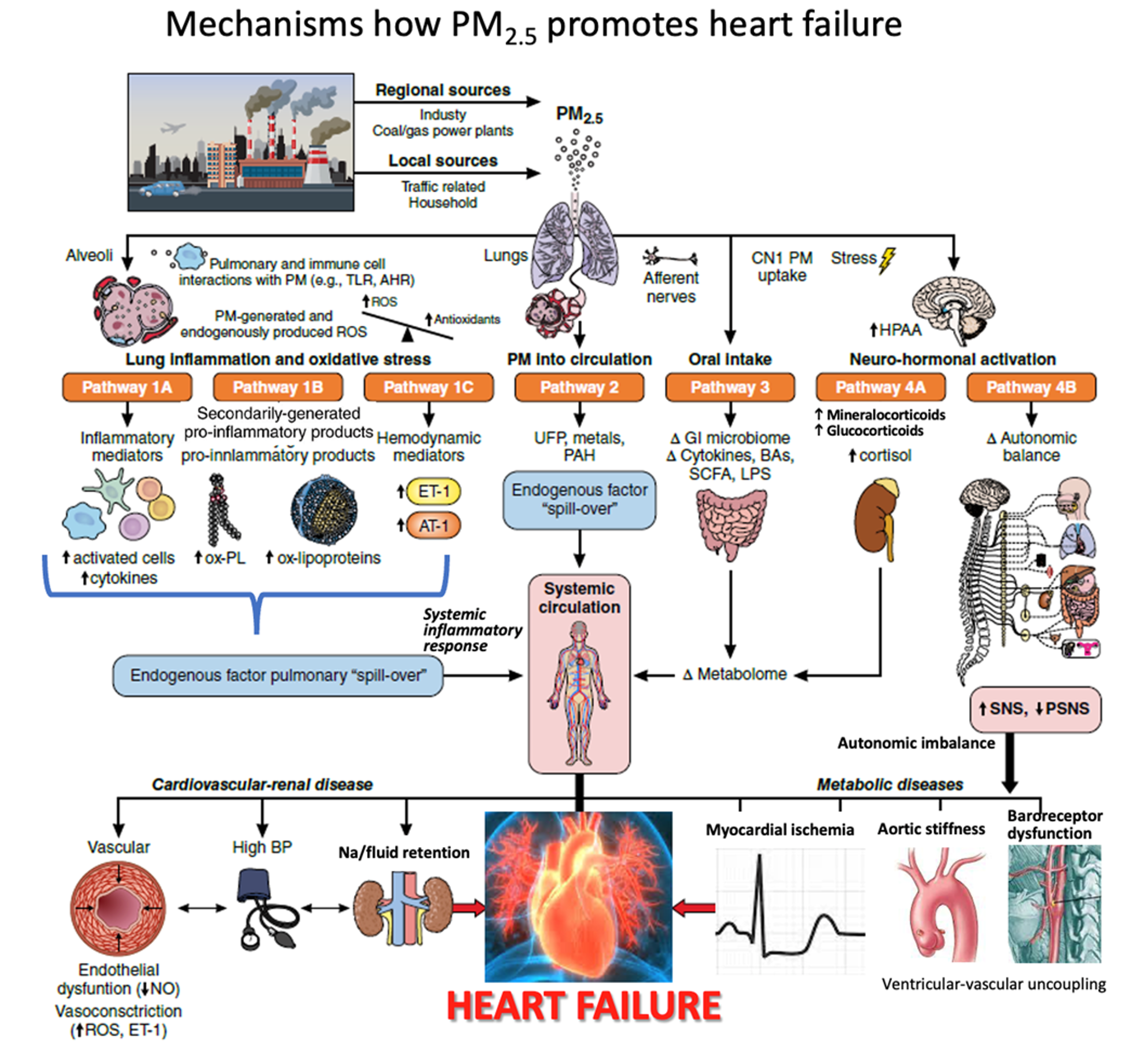PATHFINDER
Portable Air cleaners to Treat Heart Failure and Negate Disparities of Environment and Race (PATHFINDER) seeks to test for clinical health benefits of a practical but novel intervention of PAC provision at the time of hospital discharge, to estimate the burden of air pollution that recently hospitalized HF patients in Detroit (from HFH) are exposed to and its possible impact on subsequent HF outcomes, and finally to integrate the effect of the intervention with the public health burden data to generate estimates of potential public health impact of widespread PAC use on HF outcomes and related racial disparities.

● Negative SDoH and urban environmental factors (especially PM2.5) both worsen HF outcomes (readmission, death)
● Racial disparities in HF and environmental racism share epicenters in urban Black communities (i.e., a syndemic)
● Black populations are more highly-exposed (vulnerable) and also more sensitive to adverse health effects from PM2.5
● $ PM2.5 exposure by PAC use can mitigate many HF pathophysiological triggers & thus prevent acute HF
● PACs are an emerging therapeutic intervention capable of both improving HF outcomes & reducing health disparities

Investigation Team
ACHIEVE GREATER P4 leverages our multidisciplinary and collaborative team that amply provides all expertise required for successful study execution, specifically extensive experience with clinical trials, HF research and clinical care, air pollution and PAC interventions, as well as epidemiology and EHR enabled research. The team is led by a talented investigator group including the PI, Dr. Lanfear MD MS, and key Co-Investigator Robert Brook MD, along with Phillip Levy MD MPH, Steven Korzeniewski PhD, and Mei Lu PhD.
Dr. Lanfear is a board-certified Advanced HF and Transplant Cardiologist at HFH and Professor of Medicine at WSU who is a nationally recognized expert in HF clinical trials and race disparities. He has a track record of successful NIH-funded research as well as extensive clinical trial experience including leadership in multi-center trials (steering committee for GALACTIC, PRIME, CONNECT-HF, others), leading investigator-initiated clinical trials (African American IVA study, Observe-IVA), NIH trials (GRAHF), and supervising site-based clinical trial conduct (ASCEND-HF, MOMENTUM-3). Dr. Lanfear also has advanced training in study design and statistical analysis (MS in Clinical Research Design and Statistical Analysis, University of Michigan School of Public Health). Dr. Lanfear will take overall responsibility for all aspects of the study.
Dr. Brook is a truly exceptional clinician investigator with a long-standing track record of over 20 years investigating the cardio-metabolic health effects of air pollutants and environmental exposures including having conducted numerous human trials across the United States, Canada, and Asia. He has been continuously NIH-funded for decades and importantly led the first AHA scientific statement on the cardiovascular effects of air pollution in 2004, an updated statement in 2010, as well as one on personal methods to reduce health effects of air pollutant exposures in 2020. He also led a NIEHS/CDC/EPA position statement on personal preventive measures and clinical trials to prevent health effects of air pollution in 2020. His expertise is perfectly suited to this proposal, and he will be intimately involved in all aspects of the proposed project, working closely with Dr. Lanfear similar to their already close collaborations in projects 1 and 2.
Drs. Lanfear and Brook will be aided in trial (aim 1) conduct by Dr. Mei Lu who is an experience clinical trial statistician with a long track record of NIH trials such as NINDS tPA stroke trial, to her credit, and lager EMR-based observational study. Dr Lu oversees the HFH data coordinating center in the department of public health science (PHS) and is PI of Data Management Analysis Core (DMAC) for Center for Leadership in Environmental Awareness and Research (CLEAR, 1P42ES030991-01A1, funded by NIEHS). Together they have optimized study design and statistical plans and will be responsible for oversight of recruitment, PAC intervention, study operations, and patient assessments.
Dr. Levy is the overall PI of ACHIEVE-GREATER, and he and Dr. Steven Korzeniewski will help lead Aim 2, in collaboration with Dr. Lanfear and the rest of the team. Dr. Levy is Associate Vice President for Translational Science at Wayne State University (WSU), a tenured Professor of Emergency Medicine and a cardiovascular researcher with vast experience in clinical trials and a long history of NIH funding. Levy will assist Dr. Lanfear in study oversight and execution, will help lead Aim 2 and facilitate follow-up trial visits at WSU’s Clinical Research Service Center located in the Integrative Biosciences (iBio) building, where he and Dr. Lanfear already collaborate on multiple human studies including the ACHIEVE projects and other investigator initiated clinical trials. Dr. Korzeniewski is an epidemiologist and biostatistician and is co-lead for ACHIEVE-GREATER Project 1, and importantly also is the PI for Wayne State’s PHOENIX Virtual Data Warehouse and Visualization Platform (phoenix.wayne.edu). His research investigates the antecedents, and sequelae of hypertension and its correlates across the lifespan, recently emphasizing the development virtual infrastructure to facilitate large and complex team-science projects focused on health equity.
The outstanding investigative team is complimented by an extensive network of resources at WSUand HFH. These WSU and HFH resources are overseen by Dr. Levy and Dr. Lanfear, ensuring effective study execution, data sharing, efficient participant recruitment, and rigorous performance of all study procedures.
